 |
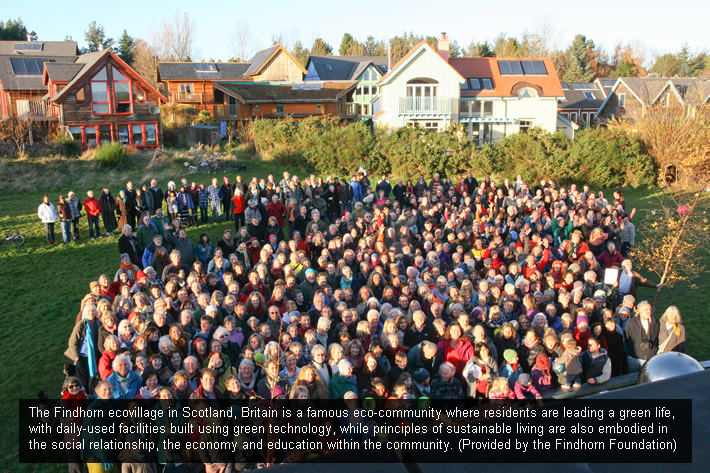
Bring Together the Power of Individuals, Build Ecovillages Around the Globe
Since the West underwent the industrial revolution and started to export the development model of industrialisation, urbanisation and modernisation to the whole world, global ecological destruction has become a growing problem. However, the high speed train of industrialisation and urbanisation is still rushing along in different parts of the world. Over the years, environmental conservationists have called attention to all sorts of ecological crises, and renowned scientists even anticipate that the earth will soon no longer be suitable for human habitation. At the same time, the process has smashed community relationships and traditional cultures. In the face of such a grim scenario, as ordinary people, what can we do to change the situation apart from waiting for the authorities to change policies?
Since the start of the 21st century, a global educational movement to promote the practice of sustainable living has, with little fanfare, unfolded. A group of forerunners have been practicing what they preach by setting up ecovillages in different parts of the world. They have come together to collate their experience and thereby develop a curriculum for the design of ecovillages (Ecovillage Design Education, EDE) to provide training for individuals and organisations from different countries in the hope that they will return to their countries and workplaces to practice what they have learnt. This issue of our e-newsletter introduces readers to this universal training curriculum and explains how it provides a tool for consciousness-raising and education around the world so that ordinary people may take part in building ecovillages or implementing relevant practices in their own areas. A colleague who once took part in the training shares how her thoughts on how her world view and life goals have been changed by the curriculum. Readers will also learn how PCD makes use of the curriculum for the training of community facilitators and that provides the momentum to our practice of sustainable living.
- Seeds in the Wind Spread Vitality of Tomorrow
- From a New World View to the Dream of Ecovillage—Wang Xiaobo (Programme Consultant, Yunnan Office, PCD)
- Using EDE Curriculum for the Training of Facilitators—Freda Ng (Programme Coordinator, PCD)
|

What Should be Done?Influenced by science fiction, Zhu Xiaoxing, our colleague in Guizhou used to feel pessimistic about the future or the planet. If the end of the world is near, it is all because of human beings, he thought. To counter this pessimism, he constantly explored how he could make contributions to the future of the world in everyday life, such as by using fewer plastic bags, making good use of “garbage”, composting at home and nurturing soil, balcony farming, and DIY enzymes production. Gradually he discovered his purpose in life and is no longer pessimistic and confused…… [More]
|
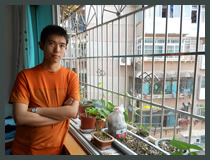 |
|

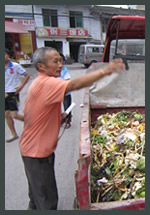 |
|

Taking On Responsibility Together -- Experience and Impact of Waste Separation in Rural Sichuan
Mainland China is experiencing a period of unprecedented economic growth. In recent years cities and towns have been under siege by garbage, and the situation in townships is often ignored. Xiao Er Township in Yibing, Sichuan was faced with such a crisis. With PCD's support, the Township has carried out a pilot programme of waste separation. The programme has had some positive outcomes after six years, including a reduction of greenhouse gas emissions and the raising of consciousness of the local residents on garbage treatment and environmental hygiene…… [More]
|
| 
| |
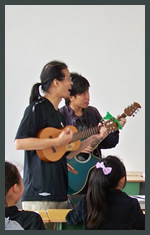 |

Congregated like a Ball of Fire, Scattered like Stars in the Sky
It has been over five years since a mega earthquake hit Wenchuan in Sichuan. Through “community arts” activities, PCD has helped to alleviate the trauma of the people affected by the disaster and to rebuild a proactive community spirit. Similar programmes may borrow from PCD’s experience which is described by Zou Qiao, our colleague who shows how community arts may bolster one’s inner being in her story of a group of secondary school students. Taking part in PCD’s programme on community arts for reconstruction, the students have developed a close relationship among themselves and gained the capacity for reflection…… [More]
|
|
 |
|
|

Eco-Houses—A Philosophy for Architecture
 |
As our country undergoes highly rapid urbanisation, traditional houses in the rural area are facing drastic changes. Everywhere in the countryside, modern houses built of cement, steel bars and bricks modelled on concrete houses in the city stand monotonously side by side. Traditional rural dwellings that embody a diverse building culture have been torn down to give way to these structures. This has given rise to a number of ecological problems including severe depletion of energy resources, high ecological cost, health hazards, etc. Farmers, moreover, are faced with a heavy economic burden due to their construction of these new houses. PCD has been introducing farmers in Sichuan to eco-houses as an alternative type of home building. Below are a few online information sources on the concept of eco-houses:
|
Handbook on Balcony Farming—Sharing from Beijing Residents
 |
To explore ways to practice sustainable living, Center for Social Invention, an NGO in Beijing which is also a partner of PCD, promoted balcony farming in four districts of Beijing in the second half of 2011. The residents gained much precious experience. To encourage the sharing of this knowledge among fellow practitioners, the experience of the Beijing residents was assembled into a handbook entitled There is a Farm on My Balcony. Copies of the handbook have been distributed to community organisations and NGOs in mainland China. Covering different methods of balcony farming and community farming, the handbook is a practical and friendly guide to all who are interested in this kind of endeavour. [Click here to download the handbook (Simplified Chinese only)] |
Appreciating Community Art Together—The Songs of Bolinwan
 |
In 2011, PCD facilitated a community art programme in Bolinwan Village of Huaxi Township, in Tongjiang County, Sichuan. A community survey was conducted and it was found that the villagers knew numerous local folk songs and many elderly villagers loved to sing them. We helped them to set up a folk song learning group and to write down the lyrics, record themselves singing them, and build a file on the folk singers in the village. We also encouraged them to teach the folk songs to the village children and to pass on the local culture. In the process, women and children also created new folk songs. We subsequently collected, documented and selected a number of traditional and newly created folk songs and children's songs and published them as a song book. Copies of the song book have been distributed to the villagers in the hope that they will continue to sing and to pass on The Songs of Bailingwan.
|
A Resource Digest on CSA in Mainland China, Hong Kong and Taiwan
 |
In late October 2012, an important seminar in Hong Kong entitled “Touching the Ground, Taking Roots—A Seminar on CSA Experience” was held by PCD for active CSA practitioners in mainland China, Hong Kong and Taiwan to meet and explore ideas of CSA and its origin and development, as well as to share experience and to exchange ideas on how to further promote CSA. The feature reports on the Seminar and information about the 30-odd participating organisations have been updated to PCD’s webpage on CSA so that practitioners may have access to the information. We hope that it will also serve as a source of mutual support and encouragement for the practitioners. Please click here to go to the webpage (Chinese only).
|
You may be interested in the following information:
Our Vision and Mission /
History of PCD /
Our Publications /
Primary Approaches – Training of Facilitators /
Where We Work
|
|
|
|

| Though we are based in different regions and have different work approaches, we are all striving to practise sustainable living, and the ripples we create will definitely benefit other partners. Please share your experience and reflections with us and send your stories to enews@pcd.org.hk. The subject of your stories should be related to your programmes. Please provide your name, project background and photographs. Please do not exceed 3,000 words. |

|
|

|

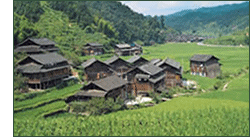 Established in Hong Kong in May 2001, Partnerships for Community Development (PCD) is a community development NGO set up and funded by the Kadoorie Foundation (via a stream of funds allocated by the Hon. Mrs McAulay). The Foundation is a Hong Kong-based trust founded in 1970 by the late Sir Horace Kadoorie, who believed in the principle,"Help people to help themselves".
Established in Hong Kong in May 2001, Partnerships for Community Development (PCD) is a community development NGO set up and funded by the Kadoorie Foundation (via a stream of funds allocated by the Hon. Mrs McAulay). The Foundation is a Hong Kong-based trust founded in 1970 by the late Sir Horace Kadoorie, who believed in the principle,"Help people to help themselves".
PCD believes that everyone, however deprived in material terms, has the right and the ability to lead a dignified and sustainable life in harmony with others, with nature, and with the world at large. Individual well-being is crucial in maintaining a harmonious and sustainable community. PCD believes that the community has to work together to reflect on its relationship with nature and on its cultural traditions.
|

Hong Kong Head Office:
13/F Chi Wo Commercial Building,
20 Saigon Street, Jordan,
Kowloon, Hong Kong
Tel: (852) 2458-0011
Fax: (852) 2430-7099
Email: info@pcd.org.hk
Webpage: www.pcd.org.hk
Programme Offices:
Sichuan Programme Office
Guizhou Programme Office
Yunnan Office
Guangxi Office
|
|
 Subscribe our E-newsletter Subscribe our E-newsletter
|
Unsubscribe
Tip - If you add enews@pcd.org.hk to your email address book, your email system will always recognize our message, ensuring our newsletter won't be classed as spam and you won't miss out. |


















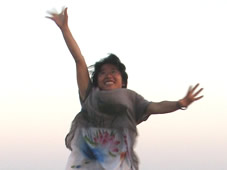

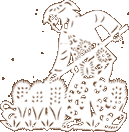





 Established in Hong Kong in May 2001, Partnerships for Community Development (PCD) is a community development NGO set up and funded by the Kadoorie Foundation (via a stream of funds allocated by the Hon. Mrs McAulay). The Foundation is a Hong Kong-based trust founded in 1970 by the late Sir Horace Kadoorie, who believed in the principle,"Help people to help themselves".
Established in Hong Kong in May 2001, Partnerships for Community Development (PCD) is a community development NGO set up and funded by the Kadoorie Foundation (via a stream of funds allocated by the Hon. Mrs McAulay). The Foundation is a Hong Kong-based trust founded in 1970 by the late Sir Horace Kadoorie, who believed in the principle,"Help people to help themselves".
